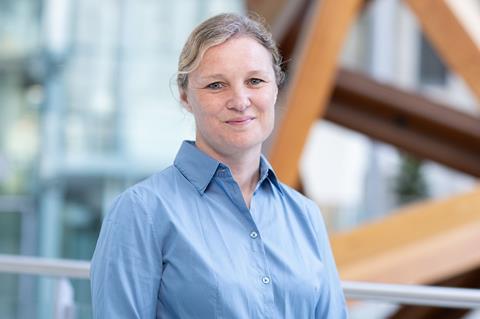MHCLG’s pick to lead the government’s delivery agency came out of left field. So what do we know about the new quango boss? And what does her appointment tell us about Homes England’s future?

The announcement last week that Amy Rees had been appointed as the new permanent chief executive of Homes England was greeted by the usual flurry of statements from the sector, warmly welcoming the quango boss and praising her track record of delivering transformation.
But, behind closed doors, one suspects that the first reaction of housebuilders, housing associations and others in the sector, was to ask: “Who is that?” Far from a familiar name in the industry, this is in fact Rees’ first role in housing.
So who, indeed, is she? And what does the government’s decision to appoint a chief from outside the sector augur for the future of Homes England?
A prisons and justice lifer - until now
Rees moves into Homes England from a director general role at the Ministry of Justice, having been interim permanent secretary in the department earlier this year. But this role was not just one stop in the career of a journeyman civil servant. Indeed, Rees has spent her entire career – up to last week – involved in the justice system in some capacity.
A student of economics, philosophy and public policy, she came across the prison service at a university jobs fair and knew immediately it was for her. In a 2023 interview with the Prison Service Journal, she described how she was immediately taken with the idea of working in prisons.
“I can’t explain to you what happened to me that day. I knew without a shadow of a doubt that that is what I wanted to do,” she said.
She got onto the accelerated graduate scheme, beginning as a frontline prison officer working in HMP Lewes in 2001. After stints at High Down and Bristol, she became the governor of Brixton prison in 2008, eventually receiving a civil service leadership award for her work at the jail.
After Brixton, she moved out of working directly in prisons, rising through a series of positions in HM Prison and Probation Service (HMPPS), including a role as principal private secretary to the justice secretaries Chris Grayling and Michael Gove, and later as the organisation’s chief in Wales. In 2022, she was appointed director general and chief executive of the entire service.
Amy Rees CV

July 2025 - August 2025 | Director general, Ministry of Justice
April 2025 - June 2025 | Interim permanent secretary, Ministry of Justice
2022-25 | Director general and chief executive, HMPPS
2019-22 | Director general probation, Wales and Youth, HMPPS
2017-19 | Executive director in Wales and strategy lead, HMPPS
2014-16 | Principal private secretary to the justice secretary, HMPPS
2012-14 | Head of delivery, Project Transforming Rehabilitation, HMPPS
2011-12 | Head of workforce strategy, HMPPS
2008-10 | Brixton governor, HMPPS
2001-08 | Frontline prison officer, HMPPS
In her interview with the Prison Service Journal, she said that HMPPS was “in my blood” and the “closest thing I can describe to a calling”. Earlier this year, Rees was awarded the Companion of the Bath (CB) for services to justice.
Given this apparent dedication to the criminal justice and prison sector, one wonders what motivated her decision to move into housing. One reason may be that she ran out of opportunities in the justice sector.
In April this year, she was named interim permanent secretary at the Ministry of Justice (MoJ), serving in the role until June, when Jo Farrar, ex-chief executive at NHS Blood and Transplant, was picked to take on the role permanently. It is not known whether Rees was a candidate for the permanent job, but if she was, it may explain her rapid departure from the MoJ.
‘Tough’ mentality and focus on delivering targets
Rees was born in 1979, on the day that Margaret Thatcher became prime minister. She told the Prison Service Journal that she used to be “a big hockey player” and that the sport had bred in her a tough mentality and team-oriented attitude. “I definitely am a ‘when the going gets tough, the tough gets going’ kind of person,” she said.
In the interview, she also alluded to another sporting influence – rowing. She said the wisdom of Olympic gold-winning rower Ben Hunt-Davis had influenced her approach to operational deliver at the head of large organisations.
Rees explained how Hunt-Davis had said that “the one thing that brought that team together was that every single day for the two years’ training before that race, they all asked themselves the same question about everything they did”. That question was: will it make the boat go faster?
“If the answer was yes, they did it, and if it was no, they didn’t. For me, in my role, my sole objective, my sole question, is asking: will it make us improve operational delivery at the frontline?”

This laser focus on delivering operational targets will be music to the ears of a government which has turned a pledge to build 1.5m homes within the parliament into a kind of sword of Damocles lingering over its head. Rees’ philosophy for achieving that improved operational delivery will no doubt be of interest to Homes England staff and the broader industry, though it is unclear whether it will be carried over to her new role.
“How am I going to improve operational delivery on the front line? By stopping doing a lot of stuff,” she said. “We’ve got a lot of change programmes, way too many in my view. I want to cut those.”
This might provide another clue to why the Ministry for Housing, Communities and Local Government (MHCLG) picked her. The i Paper recently revealed how Homes England burned through £117m on a digital transformation project known as Evolve.
Despite years of work and investment, a government review in 2024 found that the agency’s IT system remained “very labour intensive”, with Excel spreadsheets used manually to keep track of the affordable homes programme.
The eyes and ears of MHCLG?
Given this perception of prior waste within the agency, its perhaps not surprising that MHCLG has picked a civil servant to lead the organisation. One senior housing sector told Building that they thought Rees had been chosen to be the department’s “eyes and ears” within Homes England and that her appointment could even be a signal that the organisation could be insourced.
Having an established civil servant in the chief executive role would make transition easier, as she could more easily be moved into a permanent secretary role heading up housing delivery work from within MHCLG.
It’s clearly a tight leash, even if Homes England is not brought back in house
Whether or not this ends up happening, Rees’ appointment seems to indicate a move towards more hands-on involvement from the department. “Government wants control of it, and the sense is [with] Peter Denton and Nick Walkley that they didn’t really have control of it in the way that they would regard as necessary,” said the industry figure.
“It’s clearly a tight leash, even if Homes England is not brought back in house.”
Such a move would not necessarily be frowned on within the industry, he said, so long as funding for housing delivery remained protected. People will “find ways to work with whatever mechanisms there are”, he said, adding that Homes England was not “well loved as such – it’s just there”.
Whatever Homes England’s organisational future, it is sure to undergo a transformation in its operational environment as metro mayors and combined authorities take greater responsibility for housing as a result of devolved settlements. Rees is no stranger to such periods of transformation.
Her role as chief executive of HMPPS came as a result of a reorganisation which controversially brought together prisons and probation under her oversight – an approach criticised at the time by the National Association of Probation Officers and the Probation Institute. It will be fascinating to see how she handles a major period of change within a sector less familiar to her – at least for now.


























No comments yet